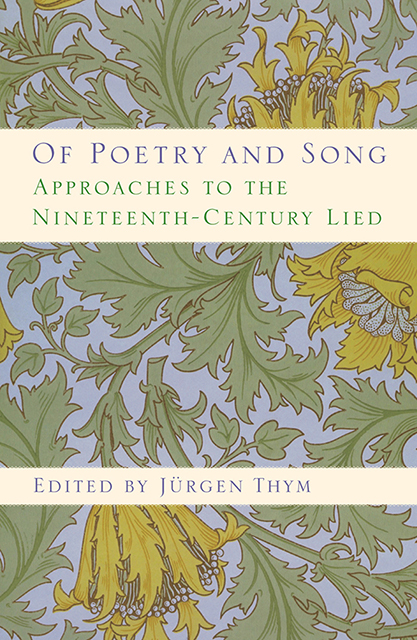Chapter Three - Text-Music Relations in Schumann’s Eichendorff Song “Frühlingsfahrt”
Published online by Cambridge University Press: 02 March 2023
Summary
Past discussions of the German Lied have focused almost exclusively on the musical side of the genre; in their pursuit of exploring increasingly subtle refinements in the Lied's musical structure, scholars have often left literary considerations at the periphery. The Lied, however, is a compound genre in which poetry and music interact: a preexistent text is usually the stimulus from which the composer derives ideas for his or her musical setting. To do justice to the genre's particular character, it is necessary to incorporate both elements when analyzing a song; that is, it is necessary to synthesize literary and musical analysis.
The present study of Schumann's song “Frühlingsfahrt” attempts such a synthesis. I begin with a detailed investigation of text modeled closely after Oskar Seidlin's excellent interpretation of the poem; then I discuss Schumann's modifications of particular words and phrases. This literary analysis will be complemented by a close study of the music as it relates to the poem on various levels.
The Poem
Eichendorff's poem “Die zwei Gesellen” (see appendix 3.1 for the poem, Schumann's version, and a prose translation) tells the story of two journeymen who begin their travels in springtime, full of hope and with expectations of mastering life. Their departure from home is not merely temporary but can be considered a start into life itself. The first young man gets married, his mother-in-law provides a house for the young family, and soon he has a son. In short, the first journeyman settles for a complacent life; it is almost ironic that soon after his departure from home he returns to a domestic existence. The life of the second man is more complex. While the female appears to the first youth as a mother, to the second she is an aggressive seductress: he fails because sirens seduce him and draw him into the carnal depths of life. When the second journeyman becomes aware of his failure it is too late, for he is old and tired.
Both stories represent tragedies of human existence. In comparison with the hopes and high expectations at the beginning of the journey, both lives are failures, since the promises of life are left unfulfilled. The first youth ends up as a Babbitt, a narrow-minded Philistine, while the other becomes exhausted and tired of life.
- Type
- Chapter
- Information
- Of Poetry and SongApproaches to the Nineteenth-Century Lied, pp. 71 - 88Publisher: Boydell & BrewerPrint publication year: 2010



